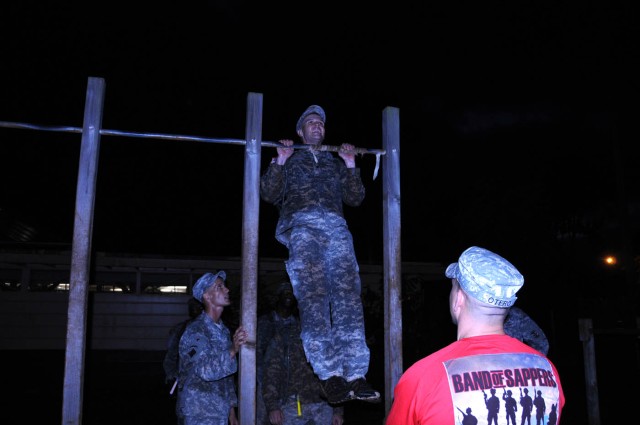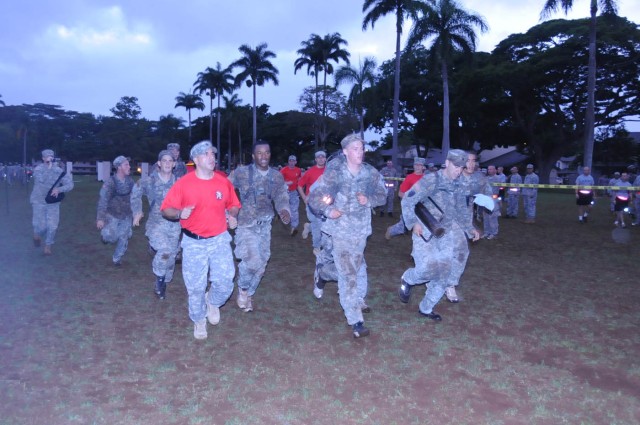SCHOFIELD BARRACKS, Hawaii (Nov. 4, 2009) - The sapper community on Hawaii witnessed a new milestone on the island when Soldiers from the 34th Sapper Company held their first annual Super Sapper Competition to test the physical ability of new Soldiers Nov. 4 on Schofield Barracks.
The event came about as a way to prepare the sapper Soldiers for competitions like Sapper Stakes (a yearly event to test a sappers knowledge), and prepare troops for the rigors of Sapper School, which many of them will be attending early next year.
"I tell my Soldiers all the time, sapper is not a school, it\'s not a job, it's a mentality and a way of life," said 1st Sgt. Bryan Otero, company first sergeant, 34th Sapper Co. "I believe training up for sapper school starts Day One when you join the Army."
Otero competed in Sapper Stakes earlier this year and applied the lessons learned to train and test his company.
"Our company stood up from scratch in March of 2009," he said. "We wanted to establish that Sapper Stakes mentality here. The commander and I talked about it and decided to make the first one physical because we have a lot of new Soldiers within the company."
During the grueling, four-day competition, Soldiers endured a squad Army Physical Fitness Test, nine-mile ruck march, litter carries, and obstacle courses pitting nine squads against each other.
"It felt pretty good competing in this challenge," said Staff Sgt. John Wolcott, 34th Sapper Co., first platoon, second squad leader. "This was the first real major task for us as a squad, and we all did everything we could to get through it."
Wolcott credits the competition for helping bring his squad closer together. "I learned what everyone was made of and what each of them could bring to the team individually," said the 27-year-old, Conyers, Ga., native. "Each one of them pushed themselves to their max and beyond; they didn't do it for themselves, but did it for the squad."
Unbeknownst to them, Wolcott's team maintained a steady forth place until day three - the nine mile ruck march. During the long trek, the squad rallied together and maintained a steady pace, which allowed them to take the lead.
"We grabbed each other during the march and pulled everyone along as a team," Wolcott said. "We were all helping out our battle buddies, so it wasn't really one person leading the whole team along, it's was everyone helping each other to get done."
Private 1st Class Tyrone Clark, a team member of second squad, said the sapper competition is what a sapper does - work hard to succeed.
"This is a testament to what sappers do," said the Craneford, N.J., native. "In competition is unity. In competition is a struggle to compete and be victorious. Competition breeds brotherhood, if we push hard and other companies and brigades can look on to this, all Soldiers can be strong - like our squad."
Wolcott echoed Otero's words about the sapper way of life.
"The sapper mentality is a lifestyle, just like the Ranger mentality and the Special Forces," he said. "You can be Airborne, a light fighter, wheel ... anything; but if you are a combat engineer, you have to live a lifestyle every day. You have to always be training up, and always be ready to go, because it's stuff like this that brings you home from deployment."
Otero took one moment to address the Soldiers who competed in the competition that it didn't matter who won but what they learned about themselves, their squads, and the Soldiers in the teams.
"The result from this is great," Otero said. "A private knows what his squad leader can do, a squad knows what the Soldiers can do and everyone grows as a squad regardless of where they placed. What everyone takes back home is they know their battle buddy to their left and right, physically and mentally because in combat that's the most important thing."




Social Sharing